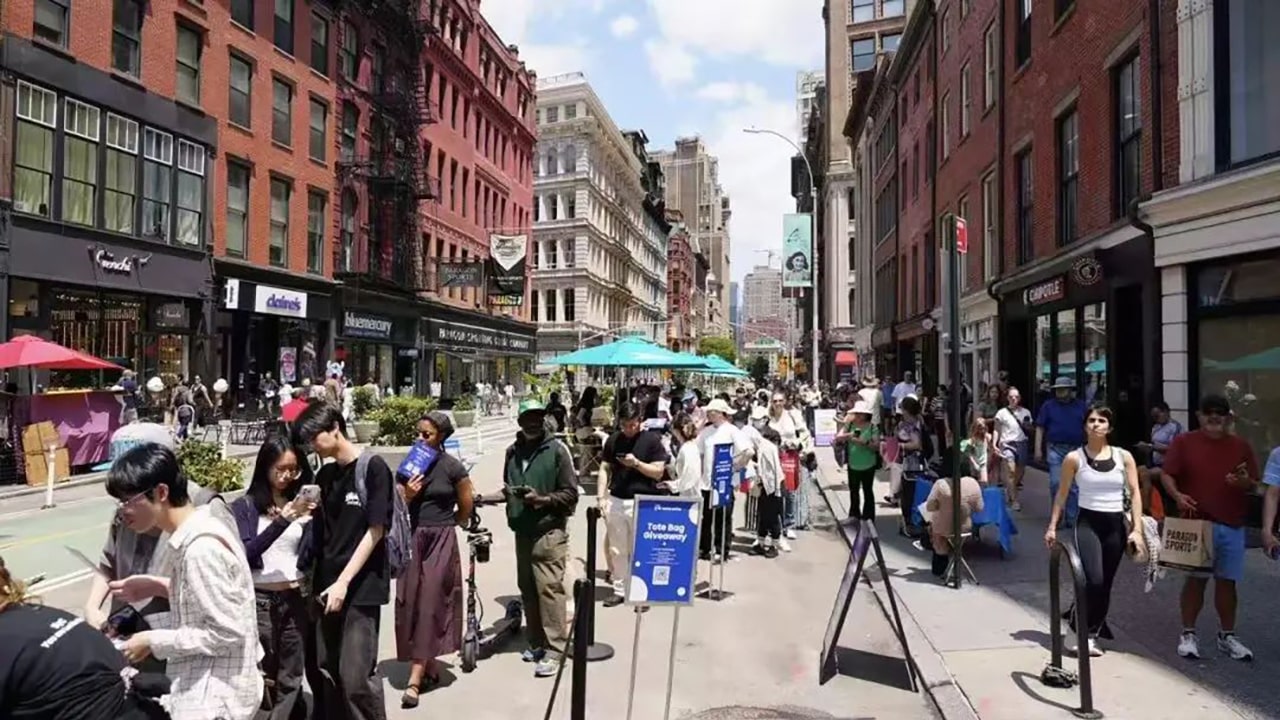Just less than a month after Luckin Coffee opened its two outlets in Manhattan, several storefronts in the bustling office area of midtown and the financial district were quickly emblazoned with an electric blue deer and the words “opening soon.”
The Chinese coffee giant has entered the US, home to Starbucks, rapidly expanding in the largest US city and adding to the list of battlegrounds on which the world’s two largest economies compete.
Luckin Coffee has held the crown as China’s top branded coffee chain since 2023, after it overtook Starbucks in both store locations and revenue.
Known for its app-based ordering system, with no cashiers and hardly any seating, Luckin is looking to replicate its success in the American market just as Starbucks looks to sunset its pickup-only stores.
At the heart of the company’s strategy is data-driven customer engagement, done through its app-based system where customers can place orders in advance and pick them up at their convenience.
Aside from standard coffee orders, Luckin also offers a wide range of creative flavored drinks headlined by its signature coconut latte.
The drink retailer is also known to offer coupons and heavy discounts on its products. Outside one of the stores, both of which opened in July, was a signboard with QR codes offering USD 0.99 beverages for new customers.
“The flavors are interesting and it’s affordable,” said Chris Ng, a student. “It’s quick and convenient for me and others who are always on the go.”
Luckin Coffee opened 2,109 stores in four countries in the second quarter, more than double the number of new stores Starbucks opened in China during the 2024 fiscal year, and has capitalized on China’s growing coffee-drinking habits. Shops were opened last quarter in Malaysia, Singapore, Greater China, and the US, which marks its first entry into a market across the Pacific Ocean.
Jinyi Guo, co-founder of the company, acknowledged the highly developed coffee market in the US but hoped the company’s unique business model will support its international expansion strategy.
“Our approach will be disciplined and deliberate, with a focus on validating consumer response to our brand positioning, digital ordering experience, product portfolio, and pricing strategy,” he said during an earnings call with analysts.
Luckin and its US representatives did not respond to requests for comment.
Yaling Jiang, an independent consumer analyst, said Luckin’s success boils down to two factors: keeping consumers hooked with innovative flavors and an accessible price point, as well as overcoming the pervasive negative perception of Chinese brands in the Western market.
“The media attention that Luckin has received may hurt the reception and ensure that consumers only see it from the filter of Chinese brand,” said Jiang, who also runs Following The Yuan, a Chinese consumer newsletter.
Launched in 2017, the coffee retailer has managed to defy the odds and make a comeback after filing for bankruptcy just less than four years ago. Luckin Coffee was embroiled in an auditing scandal and the US Securities and Exchange Commission fined the company USD 180 million for intentionally fabricating its 2019 revenue and costs.
The company dismissed its founder Jenny Qian and its COO at the time Jian Liu, along with six employees in 2020. It later filed for bankruptcy in February 2021.
Luckin began exploring beyond its home border in 2023, landing in Singapore April that year. It has since opened stores in Malaysia too.
The company’s expansion has disrupted Asian markets dominated by Starbucks and other local coffee chains.
Cotti Coffee, a rival Chinese coffee chain founded by Luckin’s former executives, also landed on American soil earlier this year, opening outlets in Brooklyn and Manhattan.
The success of Chinese coffee chains and Luckin’s nimble business model in the US remains to be seen, as automation is not as widely adopted in US consumer behavior.
Alice Nguyen, who works in finance, said she still prefers to interact with a server, despite how convenient it was to order a velvet latte on her mobile.
Starbucks announced it will close its pickup-only stores, of which there are 80–90 locations around the country, to restore its in-store experiences. Brian Niccol, CEO of the Seattle-headquartered company, said the mobile order and zero interaction model was “overly transactional and lacking the warmth and human connection that defines our brand.”
Sales of the North American coffee giant, which has 17,000 locations across the US, have been declining six straight quarters, with US same-store sales falling 2% in the most recent quarter.
This article first appeared on Nikkei Asia. It has been republished here as part of 36Kr’s ongoing partnership with Nikkei.

